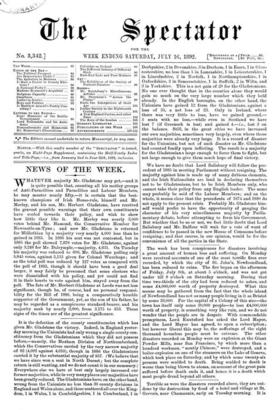The week has been conspicuous for disasters involving a great
amount of human loss and suffering. On Monday were received accounts of one of the most terrific fires ever recorded, by which the city of St. John's, Newfoundland, has been reduced to ruins. The fire began on the afternoon of Friday, July 8th, at about 5 o'clock, and was not got under till 9 o'clock on Saturday morning. During that time two-thirds of the city had been reduced to ashes, and some ¬£4,000,000 worth of property destroyed. What this means may be gathered from the fact that the whole island of Newfoundland has not as many people living in it as Bristol by some 33,000. For the capital of a Colony of this size‚ÄĒthe town has itself only some 30,000 people‚ÄĒto lose ¬£4,000,000 worth of property, is something very like ruin, and we do not wonder that the people are in despair. With commendable promptness, Lord Knntsford has asked the Lord Mayor, and the Lord Mayor has agreed, to open a subscription; but however liberal this may be, the sufferings of the eight thousand houseless people must be extreme. The other disasters recorded on Monday were an explosion at the Giant Powder Mills, near San Francisco, by which more than a hundred workmen, "mostly Chinese," were destroyed, and a boiler-explosion on one of the steamers on the Lake of Geneva, which took place on Saturday, and by which some twenty-six persona were scalded to death. Being scalded to death is worse than being blown to atoms, on account of the great pain suffered before death ends it, and hence it is a death which most people dread beyond all others.


































